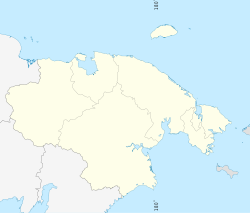Iul'tin
| Iul'tin (in English) Иультин (Russian) Ивылтин (Chukchi) |
|
|---|---|
| - Urban-type settlement - (abolished) |
|
 Location of Chukotka Autonomous Okrug in Russia |
|
|
|
|
|
|
|
| Administrative status (as of September 16, 2009) | |
| Country | Russia |
| Federal subject | Chukotka Autonomous Okrug |
| Administrative district | Iultinsky District |
| Municipal status (as of April 30, 2010) | |
| Municipal district | Iultinsky District |
| Statistics | |
| Population (April 2010 est.) | 0 inhabitants |
| Time zone | PETT (UTC+12:00) |
| Founded | 1937 |
| Abolished | 1995 |
| Postal code(s) | 689227 |
| Dialing code(s) | +7 42734 |
|
|
|
Iul'tin (Russian: Иультин; Chukchi: Ивылтин) is a former urban-type settlement in Chukotka Autonomous Okrug, part of the Far Eastern Federal District of Russia. The population is now 0, but only twenty years ago it was 3,120 (1989 Census). The settlement was established to house the workers and administrative staff of the tin and tungsten mines, with transport connections with the port, Egvekinot being constructed by GULAG prisoners. The settlement was abolished in 1995, when mining activities became no longer profitable.
Named for the nearby Mount Iultin. According to one source, the name translated from the Chukchi means "long icicle", though another source translates the name as "long feathers." It is thought that either of these translations are due to the variety of quartz veins on the mountains slopes.
The settlement was created following the discovery in 1937 of Tin and Tungsten deposits in the area. The settlement is extremely isolated and was initially not connected by any form of road to any other settlement, with supplies initially needing to be delivered by tractor convoy, a journey of some 400 km, often undertaken in bitter arctic conditions, which severely limited the distance the convoy could travel each day. Life was equally hard for the initial 73 settlers, who had to endure the harsh winter either in tents or plywood houses.
This means of supplying the settlement was ultimately impractical and in 1946, a large group of prisoners disembarked from the MV Sovetskaya Latviya in Kresta Bay and began construction of the port town of Egvekinot and the 200 km road from Egvekinot through the indigenous settlement of Amguema to Iul'tin. A diesel power plant was constructed in 1952 in Iultin to provide power to the settlement, and in 1959, a steam-driven plant in Ozyorny was completed to augment the power supply both to Iul'tin and Egvekinot.
...
Wikipedia

